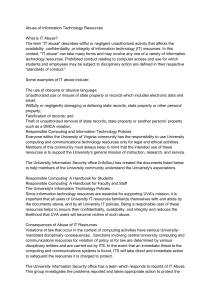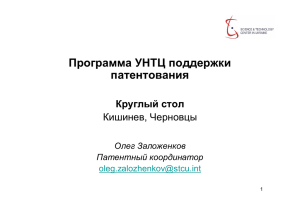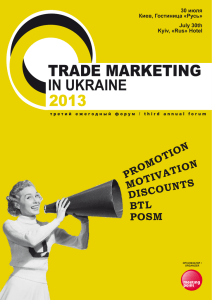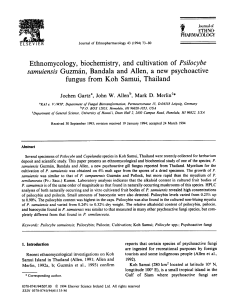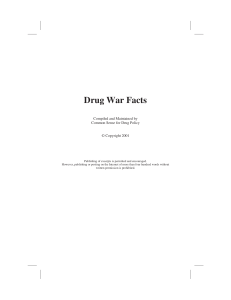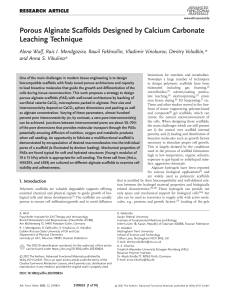серия Медицина и фармация THE PROBLEM OF TURNOVER OF
реклама
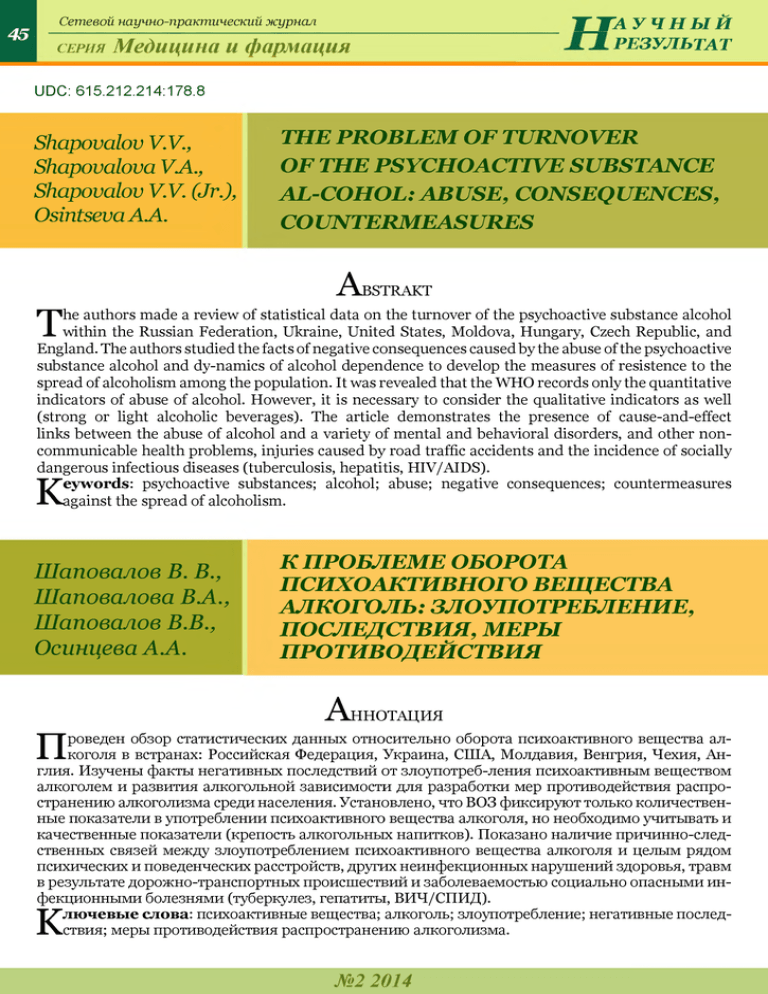
45 Сетевой научно-практический журнал сер и я Медицина и фармация ТТАУЧНЫ Й РЕЗУЛЬТАТ UDC: 6 1 5 .2 1 2 .2 1 4 :1 7 8 .8 Shapovalov V.V., Shapovalova VA., Shapovalov V.V. (Jr.), Osintseva AA. THE PROBLEM OF TURNOVER OF THE PSYCHOACTIVE SUBSTANCE AL-COHOL: ABUSE, CONSEQUENCES, COUNTERMEASURES Ab;STRAKT he authors made a review of statistical data on the turnover of the psychoactive substance alcohol within the Russian Federation, Ukraine, United States, Moldova, Hungary, Czech Republic, and England. The authors studied the facts of negative consequences caused by the abuse of the psychoactive substance alcohol and dy-namics of alcohol dependence to develop the measures of resistence to the spread of alcoholism among the population. It was revealed that the WHO records only the quantitative indicators of abuse of alcohol. However, it is necessary to consider the qualitative indicators as well (strong or light alcoholic beverages). The article demonstrates the presence of cause-and-effect links between the abuse of alcohol and a variety of mental and behavioral disorders, and other noncommunicable health problems, injuries caused by road traffic accidents and the incidence of socially dangerous infectious diseases (tuberculosis, hepatitis, HIV/AIDS). eywords: psychoactive substances; alcohol; abuse; negative consequences; countermeasures against the spread of alcoholism. T K Шаповалов В. В., Шаповалова В А ., Шаповалов В.В., Осинцева А А . К ПРОБЛЕМЕ ОБОРОТА ПСИХОАКТИВНОГО ВЕЩЕСТВА АЛКОГОЛЬ: ЗЛОУПОТРЕБЛЕНИЕ, ПОСЛЕДСТВИЯ, МЕРЫ ПРОТИВОДЕЙСТВИЯ Аш[НОТАЦИЯ роведен обзор статистических данных относительно оборота психоактивного вещества ал­ коголя в встранах: Российская Федерация, Украина, США, Молдавия, Венгрия, Чехия, Ан­ глия. Изучены факты негативных последствий от злоупотреб-ления психоактивным веществом алкоголем и развития алкогольной зависимости для разработки мер противодействия распро­ странению алкоголизма среди населения. Установлено, что ВОЗ фиксируют только количествен­ ные показатели в употреблении психоактивного вещества алкоголя, но необходимо учитывать и качественные показатели (крепость алкогольных напитков). Показано наличие причинно-след­ ственных связей между злоупотреблением психоактивного вещества алкоголя и целым рядом психических и поведенческих расстройств, других неинфекционных нарушений здоровья, травм в результате дорожно-транспортных происшествий и заболеваемостью социально опасными ин­ фекционными болезнями (туберкулез, гепатиты, ВИЧ/СПИД). лючевые слова: психоактивные вещества; алкоголь; злоупотребление; негативные послед­ ствия; меры противодействия распространению алкоголизма. П К №2 2014 :а у ч н ы и Shapovalov V.V., Shapovalova V.A., Shapovalov V.V. (Jr.), Osintseva A.A. THE PROBLEM OF TURNOVER OF THE PSYCHOACTIVE SUBSTANCE ALCOHOL: ABUSE, CONSEQUENCES, COUNTERMEASURES Introduction. The spread of alcoholism among the population throughout the world because of abuse of the psychoactive substance alcohol has one common scenario. Thus, in the pre-revolutionary period in Russia the alcohol consumption was several times lower than in our days [1]. Particularly strong growth in the use of alcohol began in the 60s, when the level of life of Soviet citizens began to rise significantly. The feature of alcoholism in Ukraine and Russia has become typical for northern Europeans model preemptive use of alcoholic beverages, contrib­ uting to severe intoxication. The main impetus for the growth of consumption of psychoactive substance alcohol and alcohol mortality in the 90s was the liberalization of the alcohol industry and, as a consequence, the increased affordabili­ ty of alcoholic beverages and alcohol [2]. The purpose o f the study. To review the statistics in the world regarding turnover of psychoactive substance alcohol, negative conse­ quences of abuse by the alcohol and dynamics of the alcohol dependence to develop measures to counter the spread of alcoholism. Materials and methods. Data from the World Health Organization (WHO); Ukrainian Medical and Monitoring Centre for Drugs and Alcohol of the Ministry of Healthcare of Ukraine; State Statistics Service of Ukraine; scientific lit­ erature sources for the period of 2004-2014. Among the methods used documentary, com­ parative, legal and graphical analysis. Results and discussion. Due to wide spread of abuse by the psychoactive substance (PAS) alcohol, that contributes to the develop­ ment and dissemination of alcohol dependence, it was of interest to analyze the statistics on al­ cohol consumption in different countries and to propose measures to prevent the spread of alco­ holism. Key facts about the abuse by the PAS alcohol in the world according to the WHO [3]: • Because of PAS alcohol abuse yearly 3.3 million people die, representing 5.9% of all deaths. • Abuse by the PAS alcohol is a causal factor in more than 200 disorders of health-re­ lated illnesses and injuries. • It is estimated in terms of DALYs (years СЕРИЯ Н РЕЗУЛЬТАТ Сетевой научно-практический журнал of life lost due to disability), 5.1% of the total global disease and injury start due to abuse by the PAS alcohol. • Abuse by the PAS alcohol leads to death and disability with respect to the earlier stages of life, and among people aged 20­ 39 years; approximately 25% of all deaths related to alcohol. • There is a causal link between the abuse by the PAS alcohol and a number of men­ tal and behavioral disorders, and other non-communicable health problems and injuries. • Recently established causal links between abuse by the PAS alcohol and morbidity with such socially dangerous infectious diseases such as tuberculosis, hepatitis, HIV/AIDS. • In addition to the harmful health effects, abuse by the PAS alcohol causes signifi­ cant social and economic costs to society as a whole. According to the WHO, chronic diseases caused because of abuse by the PAS alcohol an­ nually fatal 36 million lives. Systematic abuse of alcohol leads to the development of cardiovascu­ lar disease, because alcohol is a potent cardiac depressant, and a high mortality rate from heart disease largely due to their excessive fondness for alcoholic beverages [4]. In addition, the WHO believes that to reduce these indicators need to impose restrictions on the sale of alcohol in retail outlets, to ensure compliance with the prohibitions on advertising of alcohol and to raise taxes on alcohol products [5 ]. According to the WHO, the amount of alco­ hol that the average Ukrainian drinks per year is 15.6 liters. More than in Ukraine, drink only in Russia, Hungary, the Czech Republic and Mol­ dova (Russia topped the list with index 18.22 li­ ters of alcoholic beverages per person per year). Ukraine ranked fifth in the world in the number of surfactants consumed alcohol per citizen [3]. It is important to note, that more than two thirds of Ukrainians (69%) with some frequency con­ sume alcoholic beverages, while the number of Ukrainians who do not drink alcohol compared with 30% [5]. Медицина и фармация АУЧНЫИ РЕЗУЛЬТАТ Shapovalov V.V., Shapovalova V.A., Shapovalov V.V. (Jr.), Osintseva A.A. THE PROBLEM OF TURNOVER OF THE PSYCHOACTIVE SUBSTANCE ALCOHOL: ABUSE, CONSEQUENCES, COUNTERMEASURES At the same time the WHO fixes only quanti­ tative measure of alcohol consumption, but there is also qualitative. So, if among the inhabitants of Moldavia and Hungary there is a practice to drink dry wine, which in small doses is useful for the organism, and the population of the Czech Republic prefer other drinks beer, in Ukraine (as well as in the Russian Federation) in the greatest demand spirits, primarily vodka [6]. Data analysis of the Ukrainian Medical and Monitoring Centre for Drugs and Alcohol of the Ministry of Healthcare of Ukraine regarding the consumption of the PAS alcohol in Ukraine show that [7]: • approximately 60% of children try alcohol among parents; • the average age of a child who uses alcohol is 9 years old; Сетевой научно-практический журнал • over the last 5 years there has been an increase of 3% in the number of children who consume alcohol in adolescence (12­ 14 years); • consisting of officially registered alco­ hol-dependent individuals (about 700 thousand) to 50% (350 thousand with al­ cohol dependence) are not included in of­ ficial statistics; • about 95% of the negative consequences of irrational use of alcohol for society (ac­ cidents, antisocial behavior, domestic and industrial injury) associated with con­ sumption of alcohol. Based on the data of the State Statistics Service of Ukraine [7], Ukrainians in average 6 months in retail trade spent 11.8 billion UAH for the purchase of alcohol (Fig. 1) bil. UAH 14 - 12,4 11,8 3,5 3,3 1 0 _ tabacco alcohol "------ 1-------1-------milk products soft drinks and г bakery mineral water Fig. 1. Typical monthly spending costs among Ukrainians in retail trade fo r 6 months СЕРИЯ Медицина и фармация Shapovalov V.V., Shapovalova V.A., Shapovalov V.V. (Jr.), Osintseva A.A. THE PROBLEM OF TURNOVER OF THE PSYCHOACTIVE SUBSTANCE ALCOHOL: ABUSE, CONSEQUENCES, COUNTERMEASURES In the Russian Federation, as well as in oth­ er countries [8], the consumption of alcohol depends on its price. Analysis of the literature showed that in Russia there is from a 1999 reve­ nue growth of Russians is a serious factor in the development of alcoholism among the popula­ tion [9]. The following are statistics from other coun­ tries on the correlation of alcohol abuse and mortality. In the U.S., the percentage of young people aged 18 years and older who regularly consume alcohol (at least 12 drinks) was 50.9%; and rarely consumed (1-11 drinks) - 13.6% [10, 11]. Approximately 10% of the total number of U.S. children live with alcoholic parents, causing their health at increased risk [5]. Scientists predict alcohol over the next 20 years will be the cause of death to 210,000 resi­ dents of England, third of the deaths will caused by liver disease because of the abuse by the PAS alcohol. Other deaths related to abuse of alcohol, may occur as a result of accidents, road accidents, violence and suicide, or will be the outcome of chronic diseases such as high blood pressure, stroke, heart disease and cancer [12, 13]. Notes that alcohol abuse is not just a British problem, it exists in all the world’s richest countries. Also in 2009, British scientists point to the need for doubling the price of the most popular alcoholic beverages in the country - beer and wine [5]. When reviewing statistics on the spread of al­ cohol dependence in the world, there have been identified countermeasures, namely: • impose restrictions on the sale of alcohol in retail mar- СЕРИЯ Т Т А У Ч Н Ы Й РЕЗУЛЬТАТ Сетевой научно-практический журнал lets, ensure compliance with the prohibitions on advertising of alcohol, raise taxes on alcoholic beverages; • establish clear time limits in legal circulation of alcohol sales; • reduce the number of markets selling alcohol (per 1 sq. km.); • pro­ hibit the sale of alcohol to intoxicated people; • create network of sobering-up stations; • enter the lower threshold prices for alcohol, cheaper to sell it should be prohibited; • double the price of the most common alcohol beverages (beer and wine); • most importantly - be sure to imple­ ment and realize, not just adopt these standards [14, 15, 16]. Conclusion. Made a review of statistical data on the turnover of the psychoactive sub­ stance alcohol within the Russian Federation, Ukraine, United States, Moldova, Hungary, Czech Republic and England. Given the facts from the negative consequences of abuse by the psychoactive substance alcohol and dynamics of alcohol dependence to develop measures to counter the spread of alcoholism among the pop­ ulation. Shown that the WHO fixes only quanti­ tative indicators of abuse by the alcohol, but it is necessary to consider the quality indicators as well (castle, alcoholic beverages). Demonstrated the presence of causal link between abuse the psychoactive substance alcohol and a variety of mental and behavioral disorders, and other non-communicable health problems, injuries from road traffic accidents and the incidence of socially dangerous infectious diseases (tubercu­ losis, hepatitis, HIV/AIDS). Медицина и фармация Shapovalov V.V., Shapovalova V.A., Shapovalov V.V. (Jr.), Osintseva A.A. THE PROBLEM OF TURNOVER OF THE PSYCHOACTIVE SUBSTANCE ALCOHOL: ABUSE, CONSEQUENCES, COUNTERMEASURES а у ч н ы и РЕЗУЛЬТАТ Сетевой научно-практический журнал Л и ТЕр А Т у р А: 1. Дмитриев В. К. Критические исследо­ вания о потреблении алкоголя в России. М.: Русская панорама. 2001. 368 с. 2. Шаповалова В.А. Шаповалов В.В., Казяйчева А.А. Фармацевтическое право: изуче­ ние некоторых аспектов аддиктологии (обзор литературы) // Украшськш в1сник психоне­ врологи. 2013. Т. 21, вып. 2 (75). С. 66-69. 3. Употребление алкоголя. Инфор­ мационный бюллетень №°349 Май 2014. U R L : h t t p : / / w w w .w h o . i n t / m e d i a c e n t r e / factsheets/fs349/ru/. 4. Мисюкевич Р. Алкогол 1зм украшщв випдний ол 1гархам.- «Газета по-укра!нськи» №1490. - 28.09.2012. URL:http://gazeta.ua/ articles/com m ents-new spaper/_ alkogolizm ukrajinciv-vigidnij-oligarham/458110. 5. В ближайшие 20 лет алкоголь приве­ дет к смерти около 200 тысяч британцев - ме­ дики. 20.02.2012. URL:http://korrespondent. net/tech/health/1320928-v-blizhajshie-20-letalkogol-privedet-k-sm erti-okolo-200-tysyachbritancev-mediki. 6. Украина занимает 5-е место в мире по количеству потребляемого алкоголя на душ у населения. 26.02.2011. - URL:http://ilive.com. ua/news/ukraina-zanim aet-5-e-m esto-v-m irepo-kolichestvu-potreblyaem ogo-alkogolya-nadushu-naseleniya_96i8.html. 7. Дети в Украине спиваются с 9 лет. URL: http://mignews.com.ua/ru/articles/86873.html. 8. Osterberg E. Do Alcohol Prices Affect Con­ sumption and Related Harm? / E. Osterberg // Alcohol and Public Policy. - Oxford, New York, Toronto, Tokyo: Oxford University Press. 1995. Р. 145-158. 9. Андриенко Ю.В. Оценка индивидуаль­ ного спроса на алкоголь / Ю.В.Андриенко, А.В. Немцов. - М.: EERC, 2005. 49 с. 10. Основная статистика здравоохране­ ния для взрослых в США: National Health Interview Survey, 2010, таблица 27 [PDF - 1,3 MB], [Смерти: окончательные данные за 2009 год. URL: http://translate.google.com. ua/translate?hl=ru&langpair=en |ru&u=http:// www.cdc.gov/nchs/fastats/alcohol.htm. 11. Смерти: окончательные данные за 2009 год, таблица 12: URL: http://trans­ СЕРИЯ late. google. com. u a / t r a n s la t e ? h l = r u & l a n g p a i r = e n | r u & u = h t t p : / / w w w . cdc. g o v / n c h s / fastats/alcohol.htm. 12. Development of algorithms forensic training pharmaceutical seizures from ille­ gal substance as an element of patient protec­ tion / Shapovalov V.V. (Jr.), Shapovalova V.A., Shapovalov V.V., Shuvera E.V. // European A p­ plied Sciences. 2013. Vol. 2. № 5. P. 197-199. 13. Shapovalov V.V., Shapovalova V.O., Hmelevsky M.O. Modern state support drug patientsin rural areas: analysis of complaints of citizen son principles of medical and pharmaceutical law [Electronic resource] / V.V. Schapovalov, // E-Journal: Research Bulletin SWorld «Modern scientific research and the impractical application». 2013. Vol. J21306015. Р. 93-96. URL: http://www.sworld.com. u a/in d e x .p h p /ru /e -jo u rn a l/th e -co n te n t-o fjournal/j213/20935-j21306. 14. Судова фармащя: вивчення сучасних причин формування алкогольно'! залежност1 та и наслщюв у жш ок / Радюнова В. О., Ш а­ повалов В. В., Шаповалова В. О., Казяйчева A. О. // Укра!нський в 1сник психоневроло­ ги. 2014. Т. 22, вып. 1 (78). С.125-128. 15. Шаповалов В.В. (мол.). Судова та доказова фармащя: мониторинг проблеми алко­ гольно! залежност у захщному репош кра!ни / B.В. Шаповалов (мол.), О.В.Шувера // Науков1 дослщження та !х практичне застосування. Сучасний стан та шляхи розвитку 2013 : зб. наук. праць SWorld м 1жнар. наук.-практ. конф., 1-12 жовт. 2013 р. - Иваново: Маркова А.Д., 2013. ISSN 2224-0187. - Вып. 3, т. 48. ЦИТ: 313-0432. C. 3 - 4 . 16. Шаповалов В.В. К вопросу разработ­ ки новых схем фармакокоррекции алкоголь­ ного абстинентного синдрома в структуре алкогольной зависимости (F10.2) с учетом социальной ориентации на принципах дока­ зательной фармации / В.В. Шаповалов, И.К. Сосин, Е.В. Шувера // Научные ведомости Белгородского государственного университе­ та (Серия: Медицина. Фармация). 2014. № 4 (175), вып. 25. С. 227-231. Медицина и фармация А АУ Ч Н Ы И РЕЗУЛЬТАТ Shapovalov V.V., Shapovalova V.A., Shapovalov V.V. (Jr.), Osintseva A.A. Н THE PROBLEM OF TURNOVER OF THE PSYCHOACTIVE SUBSTANCE ALCOHOL: ABUSE, CONSEQUENCES, COUNTERMEASURES Сетевой научно-практический журнал REFERENCES: 1. Dmitriev V.K. Critical studies on alcohol consumption in Russia. M.: Russkaya panora­ ma. 2001. 368 р. 2. Shapovalova V.A., Shapovalov V.V., Kazyaycheva A.A. Pharmaceutical law: a study of some aspects of addictology (literature review) // Ukrains’kiy visnik psikhonevrologii. 2013. - T. 21, 2 (75). Рр. 66-69. 3. The use of alcohol. Newsletter № ° 349 May 2014 URL:http://www.who.int/mediacentre/factsheets/fs349/ru/. 4. Misyukevich R. Alcoholism Ukrainian oligarchs profitable. // Gazeta po-ukrains’k i” №1490. 28.09.2012.: URL: http://gazeta.ua/articles/comments-newspaper/_alkogolizm-ukrajinciv-vigidnij-oligarham/458110. 5. In the next 20 years, alcohol lead to death about 200 thousand Britons - doctors. 20.02.2012. URL://korrespondent.net/tech/ h e a lt h / 1 3 2 0 9 2 8 - v - b l iz h a js h i e - 2 0 - l e t - a lk o gol-privedet-k-sm erti-okolo-200-tysyach-britancev-mediki. 6. Ukraine is ranked 5th in the world in the number of alcohol consumed per capita. 26.02.2011. URL:http://ilive.com.ua/news/ u k ra in a -zan im a et-5 -e-m esto -v -m ire-p o -k o lich estvu -p o treb lya em o go -alk o go lya-n a -d u shu-naseleniya_96i8.html. 7. Children in Ukraine drink too m uch with 9 years. URL: http://mignews.com.ua/ru/articles/86873.html. 8. Osterberg E. Do Alcohol Prices Affect Con­ sumption and Related Harm? / E. Osterberg // Alcohol and Public Policy. - Oxford, New York, Toronto, Tokyo: Oxford University Press, 1995. Рр. 145-158. 9. Andrienko Yu. V., Nemtsov A.V. Esti­ mation of individual demand for alcohol. - M.: EERC. 2005. 49 р. 10. Summary health statistics for adults in the United States: National Health Interview Survey, 2010. table. 27 URL: http://translate.google.com.ua/translate?hl=ru&langpair=en|ru&u=http://www.cdc.gov/nchs/ fastats/alcohol.htm. 11. Summary health statistics for adults in the United States: National Health Inter­ СЕРИЯ view Survey, 2010. table.12: URL:http://translate.google.com .ua/translate?hl=ru&langpair=en|ru&u=http://www.cdc.gov/nchs/ fastats/alcohol.htm 12. Development of algorithms forensic training pharmaceutical seizures from ille­ gal substance as an element of patient protec­ tion / Shapovalov V.V. (Jr.), Shapovalova V.A., Shapovalov V.V., Shuvera E.V. // European A p­ plied Sciences. 2013. Vol. 2. № 5. P. 197-199. 13. Shapovalov V.V., Shapovalova V.O., Hmelevsky M.O. Modern state support drug patientsin rural areas: analysis of complaints of citizen son principles of medical and phar­ maceutical law // E-Journal: Research Bulletin SWorld «Modern scientific research and the im ­ practical application». 2013. Vol. J21306-015. Рр. 93-96. URL: http://www.sworld.com.ua/ index.php/ru/e-journ al/the-con ten t-of-journal/j213/20935-j21306. 14. Trial Pharmacy: study of contemporary reasons for the formation of alcohol dependence and its consequences for women / Radionova V. O., Shapovalov V. V., Shapovalova V. O., Kazyaycheva A. O. // Ukrains’kiy visnik psikhonevrologii. 2014. Vol. 22. №1 (78). Рр.125-128 15. Shapovalov V.V(Jr.)., Shuvera O.V. Trial and evidence pharmacy monitoring problems of alcohol dependence in the western region of the country // Nauchnye issledovaniya i ikh prakticheskoe primenenie. Sovremennoe sostoyanie i puti razvitiya 2013: sb. nauk. rabot SWorld mezhdunar. nauchno-prakticheskoy. konf., 1-12 okt. 2013 - Ivanovo: Markova A.D., 2013 -ISSN 2224-0187. - Vol. 3 (48). TsIT: 313-0432. Р. 3 -4 . 16. Shapovalov V.V., Sosin I.K., Shuvera E.V. On the question of the development of new schemes farmakokorrektcii alcohol withdraw­ al syndrome in the structure of alcohol depen­ dence (F10.2), taking into account the social orientation of the principles of evidence-based pharmacy // Nauchnye vedomosti Belgorodskogo gosudarstvennogo universiteta (Seriya: Meditsina. Farmatsiya). 2014. № 4 (175), vol. 25. Pp. 227-231. Медицина и фармация Shapovalov V.V., Shapovalova V.A., Shapovalov V.V. (Jr.), Osintseva A.A. THE PROBLEM OF TURNOVER OF THE PSYCHOACTIVE SUBSTANCE ALCOHOL: ABUSE, CONSEQUENCES, COUNTERMEASURES АУЧНЫЙ РЕЗУЛЬТАТ Сетевой научно-практический журнал СВЕДЕНИЯ ОБ АВТОРАХ: DATA A B O U T THE AUTHORS: Шаповалов Валентин Валерьевич, доцент кафедры медицинского и фармацевтического права, общей и клинической фармации, кандидат фармацевтических наук, доцент Харьковская медицинская академия последипломного образования, пл. Свободы, 5, Госпом, 7 подъезд, 5 этаж, к. 801, г. Харьков, 61022 krisa83@bk.ru Shapovalov Valentin Valerievich PhD in Pharmaceutical Sciences, Assosiate Professor Department of Medical and Pharmaceutical Law, General and Clinical Pharmacy Kharkiv Medical Academy of Postgraduate Education 5 Svobody Sq., Kharkiv, 61022, Ukraine E-mail: krisa83@bk.ru Шаповалова Виктория Алексеевна, заведующая кафедрой медицинского и фармацевтического права, общей и клинической фармации, доктор фармацевтических наук, профессор Харьковская медицинская академия последипломного образования, пл. Свободы, 5, Госпом, 7 подъезд, 5 этаж, к. 801, г. Харьков, 61022 krisa83@bk.ru Shapovalova Viktoriya Alekseevna Doctor o f Pharmaceutical Sciences, Professor Head of the Department of Medical and Pharmaceutical Law, General and Clinical Pharmacy Kharkiv Medical Academy of Postgraduate Education 5 Svobody Sq., Kharkiv, 61022, Ukraine E-mail: krisa83@bk.ru Шаповалов Валерий Владимирович, начальник отдела фармации Департамента здравоохранения Харьковской областной государственной администрации, доктор фармацевтических наук, профессор Департамент здравоохранения Харьковской областной государственной администрации, пл. Свободы, 5, Госпом, 7 подъезд, 5 этаж, к. 801, г. Харьков, 61022 krisa83@bk.ru Shapovalov Valeriy Vladimirovich Doctor o f Pharmaceutical Sciences, Professor Head of the Pharmaceutical Division at the Department for Health of Kharkov Regional Administration Kharkiv Medical Academy of Postgraduate Education 5 Svobody Sq., Kharkiv, 61022, Ukraine E-mail: krisa83@bk.ru Осинцева Алина Александровна, ст. лаборатнт кафедры медицинского и фармацевтического права, общей и клинической фармации Харьковская медицинская академия последипломного образования, пл. Свободы, 5, Госпом, 7 подъезд, 5 этаж, к. 801, г. Харьков, 61022 krisa83@bk.ru Osintseva Alina Alexandrovna Senior Lab Assistant Department of Medical and Pharmaceutical Law, General and Clinical Pharmacy Kharkiv Medical Academy of Postgraduate Education 5 Svobody Sq., Kharkiv, 61022, Ukraine E-mail: krisa83@bk.ru Рецензент: Васина Ю.В., доцент кафедры медицинского и фармацевтического права, общей и клинической фармации; кандидат фармацевтических наук; доцент; Харьковская медицинская академия последипломного образования Vasinа Yu.V., assistant professor of medical and pharmaceutical law, general and clinical pharmacy board; PhD; assistant professor; Kharkiv medical academy of postgraduate education СЕРИЯ Медицина и фармация
